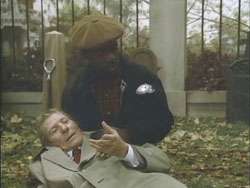Paladin of the Lost Hour
| "Paladin of the Lost Hour" | |
|---|---|
| The Twilight Zone episode | |
 Scene from "Paladin of the Lost Hour" | |
| Episode no. |
Season 1 Episode 7b |
| Directed by |
Gilbert Cates (credited as Alan Smithee) |
| Written by | Harlan Ellison |
| Original air date | November 8, 1985 |
| Guest appearance(s) | |
|
Danny Kaye: Gaspar | |
"Paladin of the Lost Hour" is the second segment of the seventh episode from the first season (1985–86) of the television series The Twilight Zone, as well as a novelette by script-writer Harlan Ellison. It starred Danny Kaye in one of his final screen appearances.
Plot
An old, grieving man named Gaspar is standing over a grave in a cemetery when he is attacked by a couple of muggers. As one of the muggers attempts to steal his pocket watch, it begins to glow and burns the mugger’s hand. Floating through the air, it returns to Gaspar. A man named Billy, who was at the cemetery visiting, joins him and helps him.
Both Gaspar and Billy go to Billy’s apartment and discuss what happened at the cemetery. Gaspar tells him he was there to visit his girl and Billy tells him he was visiting a friend’s grave. Billy leaves for work but allows Gaspar to stay and rest.
When Billy returns, he finds that Gaspar is still in the apartment cooking dinner. He also discovers that Gaspar is homeless and dying, and he offers to let him stay at his apartment. Gaspar, meanwhile, discovers that Billy was visiting the grave of a man he fought with in the Vietnam War.
As they watch the news, Billy worries that the world is close to a nuclear war, however Gaspar tells him it is not possible because it is only 11 o’clock. Billy questions why Gaspar’s watch is stuck at 11 o’clock. Gaspar dismisses it and talks about how he will miss his girl Minna. Billy tells him about his experiences in Vietnam and explains that the man he visits in the cemetery was a man who sacrificed himself to save his life. Billy has been racked with guilt ever since.
That night, while Gaspar is asleep, Billy tries to look at the pocket watch but it floats away from him and returns to Gaspar, who upon awakening catches it and proceeds to tell Billy what "Gaspar" means: it is the master of the treasure, keeper of the secrets and paladin of the palace. Gaspar wants Billy to accompany him to the cemetery the next day because he believes he is going to die.
At the cemetery, Gaspar tells Billy the story of how a pope from the 16th century decreed that the entire civilized world would observe the calendar with solstices and equinoxes. But the pope's calculations were off by one hour. That hour "slipped free and bounced through eternity." It is an hour that must never be used, and must never toll. To do so would bring eternal night when the pocket watch tolls midnight.
If Gaspar is to die before passing it on to another paladin, the watch will begin to tick. He offers it to Billy to whom he believes the lost hour can be trusted, but Billy claims he is not worthy. Gaspar says he is and tests him by asking Billy to allow one minute for Gaspar to call back Minna and enjoy one minute with her.
Billy has an ethical problem with the request and refuses it. Gaspar tells Billy that his response was the correct answer and that he passed the test. Gaspar then tells him he is going to give him a gift and lets the watch tick. A wild wind comes up and Billy has a vision of a marine in dress uniform. Although he says nothing, Billy smiles knowingly as the wind dies down and the marine disappears.
Billy notices Gaspar on the ground and tells him that the marine let him off the hook, relieving him of his guilt. The other man never knew he saved Billy’s life and thought he died in vain. Gaspar’s eyes open and he gives Billy the watch and then dies.
Closing narration
| “ | Like a wind crying endlessly through the universe, time carries away the names and deeds of conquerors and commoners alike. And all that we were, all that remains is in the memories of those who cared we came this way for a brief moment. A blessing of the 18th Egyptian Dynasty: God be between you and harm in all the empty places you walk. | ” |
Note
The novelette, written by Harlan Ellison, won the 1986 Hugo Award for Best Novelette and the script won the 1987 Writers Guild of America Award for Anthology Episode/Single Program. The story is available in Ellison's collection Angry Candy.
The novelette and script were written at the same time. Although in the original story it is not stated which man is black and which is white, Ellison wrote the script specifically with Turman in mind. The tale originally had a different ending. When the show's producers said that it needed to be changed, Ellison initially balked. It was only because the producers were also writers for whom Ellison had respect that he considered their idea. He eventually decided that they were correct, and changed both the script and the novelette.[1]
See also
References
- ↑ Ellison, Harlan (1995). "Harlan Talks About Writing 'Paladin'". Ellison Webderland. Retrieved January 9, 2015.